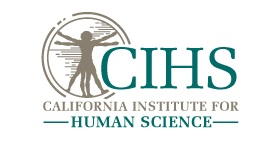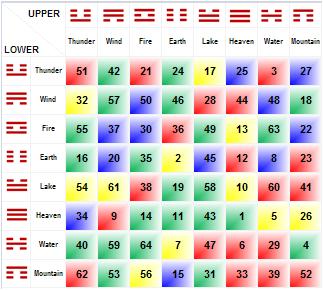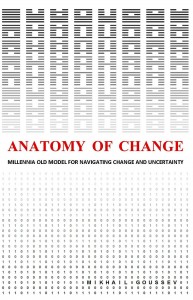“Everything in the universe, from human relationships to high energy particle interactions is participating in a ceaseless process of change guided by simple, yet universal patterns. From the beginning of philosophical thought in ancient China, nearly 4000 years ago through current research in physics and molecular biology, one basic question is being posed: How do phenomena change?” (Phillips, 1992)
The ancient Chinese Classic of Changes, or the I Ching, postulates the existence of the 64 UNIVERSAL PATTERNS allowing us to have a glimpse in the nature of change in the context of human relationships and organizational structures.
Navigating Change with the I Ching
![]() Chance Method: Formulate your question and generate a random pattern; this approach helps engage the intuitive mind to bring up relevant insights and solutions.
Chance Method: Formulate your question and generate a random pattern; this approach helps engage the intuitive mind to bring up relevant insights and solutions.
![]() Choice Method: Define your situation and construct a pattern based on the underlying drivers; helps engage the analytical mind to thrink through the dynamics of change.
Choice Method: Define your situation and construct a pattern based on the underlying drivers; helps engage the analytical mind to thrink through the dynamics of change.
![]() Get an Opinion: Describe your situation succinctly, state your question and submit via the Contact Form; we’ll review selected cases and provide insights via email.
Get an Opinion: Describe your situation succinctly, state your question and submit via the Contact Form; we’ll review selected cases and provide insights via email.
Anatomy of Change Book
“Everything in the universe, from human relationships to high energy particle interactions is participating in a ceaseless process of change guided by simple, yet universal patterns. From the beginning of philosophical thought in ancient China, nearly 4000 years ago through current research in physics and molecular biology, one basic question is being posed: How do phenomena change?” (Phillips, 1992)
The book Anatomy of Change: Millennia Old Model For Navigating Change and Uncertainty by Mikhail Goussev explores one of the world oldest and perhaps the most universal system developed by mankind – the I Ching, or the ancient Chinese Classic of Change – to address this question in the context of human relationships and organizational dynamics.
Related information:
- View book content in Google Books
- To purchase the book please visit Amazon or CIHS Bookstore
- Watch “Navigating Change and Uncertainty Workshop with the Classic of Change”
- Refer to the materials for Anatomy of Change lectures and workshops
__________________________________________________________________
Book Reviews:
 Mikhail’s dissertation, which served as a foundation for this book, pursued the bold goal of establishing parallels between the ancient Taoist philosophy and worldview and the present economic model of the Western world based on the universal principals of Yin and Yang. This book addresses some of the critical feedback I had provided and makes this theory applicable and stimulating to individuals in the fields of business and economics. I hope many people will use Mikhail’s book to gain insights that are relevant to their present and future professional activities.
Hiroshi Motoyama, Ph.D., Ph.D. President of CIHS
The book Anatomy of Change by Mikhail Goussev is the most up-to-date explanation of the ancient Chinese classic, the I Ching, teaching humanity how to adapt to inevitable changes while keeping the constancy of our human-heartedness. There is no other research in China or in the West that makes the sophisticated patterns of change described in the I Ching so easy to understand and apply to our daily activities in business world, and personal and professional relationships. It is a must-read book for everyone who wishes to understand the wisdom of the Chinese civilization and why this longest-lived society in human history is able to develop faster than that of any other younger nation.
Tanya Storch, Ph.D. Professor of Buddhist Studies, University of the Pacific
Mikhail’s dissertation, which served as a foundation for this book, pursued the bold goal of establishing parallels between the ancient Taoist philosophy and worldview and the present economic model of the Western world based on the universal principals of Yin and Yang. This book addresses some of the critical feedback I had provided and makes this theory applicable and stimulating to individuals in the fields of business and economics. I hope many people will use Mikhail’s book to gain insights that are relevant to their present and future professional activities.
Hiroshi Motoyama, Ph.D., Ph.D. President of CIHS
The book Anatomy of Change by Mikhail Goussev is the most up-to-date explanation of the ancient Chinese classic, the I Ching, teaching humanity how to adapt to inevitable changes while keeping the constancy of our human-heartedness. There is no other research in China or in the West that makes the sophisticated patterns of change described in the I Ching so easy to understand and apply to our daily activities in business world, and personal and professional relationships. It is a must-read book for everyone who wishes to understand the wisdom of the Chinese civilization and why this longest-lived society in human history is able to develop faster than that of any other younger nation.
Tanya Storch, Ph.D. Professor of Buddhist Studies, University of the Pacific
In our drive to discover new tools for better understand and managing change, we short-sightedly overlook older tools long available to those willing to understand them. In The Anatomy of Change, Michael Goussev calls forth the millennia old empirical observations of China captured in the Classic of Change (The I Ching). He shows that seeking to understand how the 64 recurring patterns of change documented in this text can help us better grasp the forces influencing our day-to-day lives, personally and professionally. His book gives us tools to reflect powerfully on how to more thoughtfully navigate the change and uncertainty we all face at key points in our lives and careers.
Kaihan Krippendorff, Author of “Outthink the Competition”, www.kaihan.net

